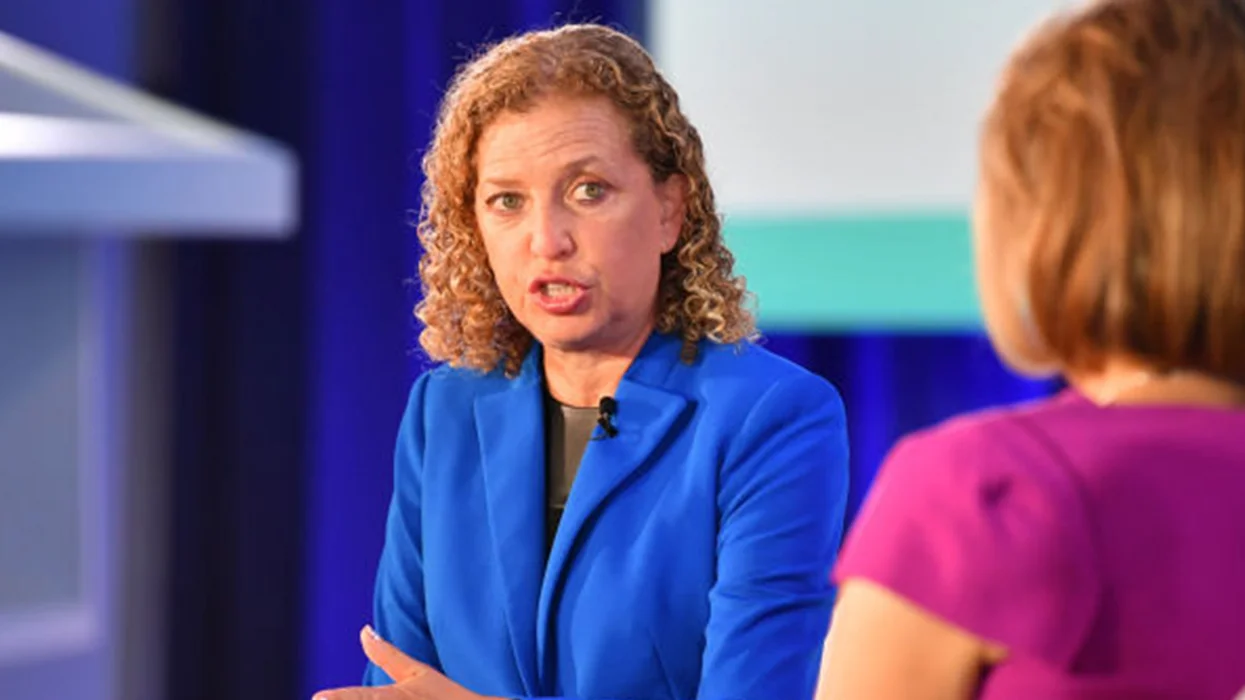
© 2025 Blaze Media LLC. All rights reserved.
"Conservatives have not paid enough attention to getting our agenda enacted into law. "
When it comes to keeping Republican leadership in the House of Representatives from losing its backbone, there's a new sheriff in town. And he is openly willing to admit that he wants to not only prevent moderation, but actively "pull our leadership back to the right when they veer off course," to use his words.
In fact, this same man already has plans to aggressively push legislation that will "not only...repeal Obamacare, but also...replace it with conservative solutions that will lower costs for families by promoting competition and innovation without the taxes and mandates in the President's law?" And in that effort, he has already gotten House Republican leadership to accept the idea that "achiev[ing] a balanced budget in 10 years" should be a major conservative priority in the future.
Who is the person who has announced his plans to do this? Read on.
Despite the fact that Republicans hold a clear majority in the House of Representatives, many conservatives often express less-than-muted discontent over the state of leadership and tactics among congressional Republicans. This discontent reached a fever pitch earlier this year, when the need to elect a Speaker prompted many in the conservative grassroots to openly question whether Boehner would survive another vote, with more than a little schadenfreude undergirding their questioning.
 Speaker John Boehner (Photo Credit: AP)
Speaker John Boehner (Photo Credit: AP)
In the end, of course, Boehner won handily, with barely enough people voting against him to make it into the double digits. However, those who did vote against him were among the House's most stalwart conservatives, and almost without exception, their votes - for candidates such as Jim Jordan (R-OH) and Eric Cantor (R-VA) - went to candidates who were members of one little known, but highly influential group: The Republican Study Committee, or RSC.
 House Majority Leader Eric Cantor (Photo Credit: AP)
House Majority Leader Eric Cantor (Photo Credit: AP)
For those with knowledge of the inner workings of Congress, this fact should surprise no one. The RSC, which is known in many circles as the voice of committed conservatives within the House of Representatives, boasts an impressive 170 members of Congress, all Republicans, in its ranks. In other words, while Republicans control the majority in the House, the RSC controls the majority of the Republicans. This may explain why the last minute fiscal cliff deal, which garnered opposition from House conservatives generally, and the RSC especially, passed thanks to the votes of Democrats, rather than Republicans. Such is the pull of this little known group.
 Paul Weyrich, founder of the RSC (Photo Credit: AP)
Paul Weyrich, founder of the RSC (Photo Credit: AP)
The history of the RSC reads in some ways like a who's who of conservatism. Founded in 1973 by conservative organizing giant Paul Weyrich, who would later go on to found the Heritage Foundation as well, and in whose name a weekly lunch is still held for conservatives. The RSC was explicitly designed to keep a handle on Republican congressional leaders and prevent them from moderating too aggressively. Given that 7 of 9 members of the current Republican leadership in the House are themselves members of the RSC (Speaker Boehner and Majority Whip Kevin McCarthy being the lone exceptions), this mission is presumably much easier in the present climate.
It is not difficult to see why ambitious politicians would flock to this group. Among its past members are two former Vice Presidents (Dan Quayle and Dick Cheney), as well as seven sitting Senators and three sitting Governors. Of those Governors, Mike Pence, the current Governor of Indiana, and a man who many floated in the last election as a Presidential prospect, and no doubt will be floated again in 2016, spent two years as leader of the RSC. Jim Jordan, who until this year was the chair of the RSC, earned more than a few feathers in his cap by nearly passing a budget that outpaced even Rep. Paul Ryan's in fiscal conservatism, and acting as one of Boehner's lead internal critics on the debt ceiling deal two years ago.
 Speaker John Boehner (left) and Rep. Jim Jordan (right) (Photo Credit: AP)
Speaker John Boehner (left) and Rep. Jim Jordan (right) (Photo Credit: AP)
Here's Jordan explaining his opposition to making "deals" over taxation:
However, now that Jordan has stepped down, a new face has assumed control of the group, and with it, the position of "conscience" for House conservatives. That new leader is Rep. Steve Scalise of Louisiana, who was described by the American Spectator this way prior to his election:
In just four years, Scalise has forged a reputation as an intelligent bulldog with an appetite for chomping away at big government. Consider several of his high-profile accomplishments.First, Scalise authored an amendment that made it all the way into law, despite objections from President Obama, that eliminated four of Obama’s unaccountable policy “czars.”
Second, while everybody else in a committee hearing seemed to be kowtowing to the supposed moral authority of former Vice President Al Gore on cap-and-trade legislation, Scalise effectively raked Gore over the coals, as can be seen in this video link. (He did much the same to Energy Secretary Steven Chu, calling him to account for Chu’s earlier advocacy of high gas prices as a good idea and blasting him for his role in the Solyndra scandal.) Indeed, Scalise has made himself perhaps the “go-to guy” for all House conservatives when it comes to energy policy.
Third — and this one was fun — Scalise almost single-handedly stopped Barack Obama from being the Grinch who taxed Christmas trees. Obama tried to assess a 15-cent tax on trees as a “fee,” but Scalise got wind of it and, as Fox News noted, raised such a stink that Obama was forced to reverse himself.[...]
His conservative interest-group ratings are strong, too: 97 lifetime from the American Conservative Union, 100 lifetime from National Right to Life, 100 lifetime from the National Federation of Independent business, and an A+ from the National Rifle Association.
 Rep. Steve Scalise (Photo Credit: AP)
Rep. Steve Scalise (Photo Credit: AP)
Scalise won election to his position by a close vote against Rep. Tom Graves of Georgia, and is already generating buzz. Said one Senior GOP aide, "RSC Chairman Jim Jordan is a hard act to follow, but it looks to most folks I know that Chairman Scalise is doing it. He's already pushing back against leadership, advancing some conservative ideas, and banking some wins."
Here's Scalise talking about the necessity for serious solutions after the 2012 election on CBS:
To find out how Scalise himself plans to keep "banking wins," TheBlaze interviewed him via email about his view of the future of the conservative movement broadly and the Republican Study Committee specifically:
TheBlaze: What do you see as the key issues for the conservative movement in the present climate?
Scalise: The primary issue for the conservative movement is preserving the American Dream for our children by cutting spending and getting us on a path to balance the federal budget. I have two young children and every vote I take I think about the impact it will have an their ability to have the same opportunities I enjoyed when I grew up. Washington needs to work towards solutions that will reduce our debt and deficit so that we can get our economy back on track and future generations are not burdened by our mistakes today.
TheBlaze: In the past, you have stated that the RSC "needs to actually focus on implementing conservative solutions." What conservative solutions do you think should be offered, and to which issues? Will you be introducing legislation on these issues?
Scalise: There is a place for conservative solutions to all the big problems that are currently facing America and I plan for the RSC to continue bringing legislation forward to solve those problems from a conservative perspective. One example of legislation RSC will be promoting involves health care, where our Members have bills not only to repeal Obamacare, but also to replace it with conservative solutions that will lower costs for families by promoting competition and innovation without the taxes and mandates in the President's law. We also plan on bringing an RSC jobs bill that focuses on economic growth by lowering tax rates, increasing American energy production, and rolling back the radical regulations that are killing jobs and stifling growth.
RSC members have and will continue to produce conservative legislation. The latest conservative solution that is being embraced by leadership is achieving a balanced budget in 10 years, which was has been a hallmark of the RSC's budget.
TheBlaze: Given that you control a majority of House Republicans, including 7 of the 9 current members of leadership, how closely do you expect to work with the leadership to push the RSC's goals?
Scalise: The job of the RSC is to be the conservative rudder of the House, and that means we should fight to promote conservative legislation to our nation's problems and push our leadership to bring those bills to the House Floor, but we also stand ready to pull our leadership back to the right when they veer off course.
TheBlaze: You've stated in the past that it is necessary for Republicans to "unite as conservatives if we're going to get things done." How far does the necessity to unite extend? Will you still push back on leadership?
Scalise: With more than 165 members, the RSC is a powerful bloc of votes in the Republican conference, and I intend to unify the RSC around conservative solutions as we present common sense alternatives to the problems facing our nation. House Republicans have been most united when we are fighting for conservative principles, whether it was our support for the RSC-proposed "Cut, Cap, and Balance" legislation, or our united opposition to the failed stimulus and Obamacare. There will be times when we are in agreement with our leadership's approach to the challenges we face, but there will also be times when we disagree with our leadership. During those times when we disagree with our leadership, we will work to pull them back to the right, but also stand ready to fight any proposals that violate our conservative principles.
TheBlaze: What areas of public policy do you think conservatives have ignored to their detriment?
Scalise: Conservatives have not paid enough attention to getting our agenda enacted into law. We have come up with great solutions to America’s problems, but have been largely unsuccessful at getting conservative policy enacted. A bill that does not get passed, no matter how great the bill is, does not help American families who are struggling under the weight of Obama's failed agenda, and this Congress I hope to work with the RSC to pass bills that will help preserve the American Dream, put us on the path to a balanced budget, and finally cut spending so we can reduce the mountain of debt that has been piled on the backs of our children and grandchildren.
TheBlaze: The RSC was founded by Paul Weyrich, who was never elected to Congress. Do you foresee grassroots activists and other outsiders being able to influence Congress so directly in the future?
Scalise: I see the grassroots as an important part of the RSC, and in fact just Wednesday I spoke at the Weyrich lunch. The RSC would not be the powerful force we are today without this strong grassroots influence, and I look forward to continuing to work with conservative outside groups to help us achieve our shared beliefs and goals so we can advance the conservative movement.
Want to leave a tip?
We answer to you. Help keep our content free of advertisers and big tech censorship by leaving a tip today.
Want to join the conversation?
Already a subscriber?
more stories
Sign up for the Blaze newsletter
By signing up, you agree to our Privacy Policy and Terms of Use, and agree to receive content that may sometimes include advertisements. You may opt out at any time.
Related Content
© 2025 Blaze Media LLC. All rights reserved.
Get the stories that matter most delivered directly to your inbox.
By signing up, you agree to our Privacy Policy and Terms of Use, and agree to receive content that may sometimes include advertisements. You may opt out at any time.





